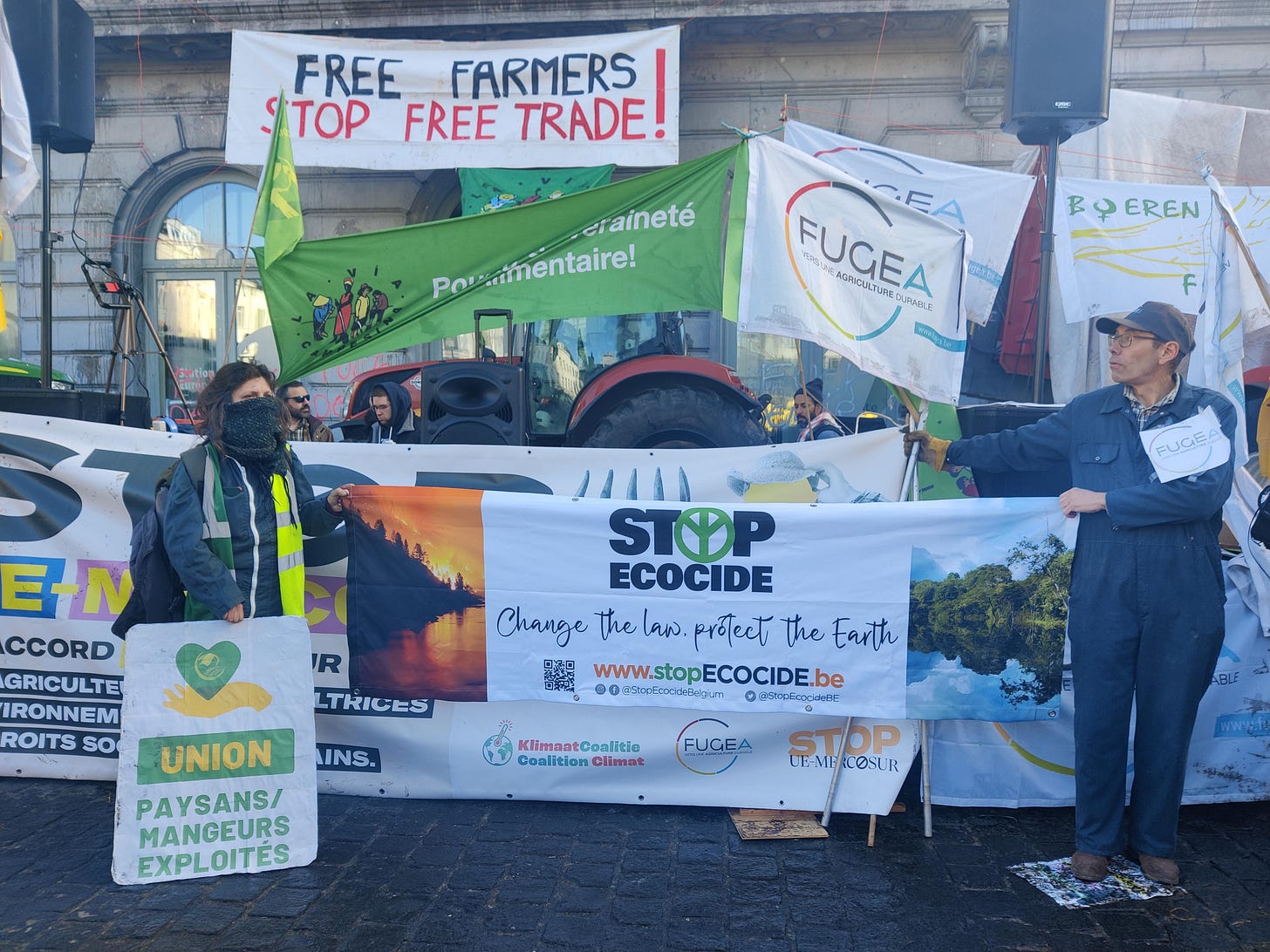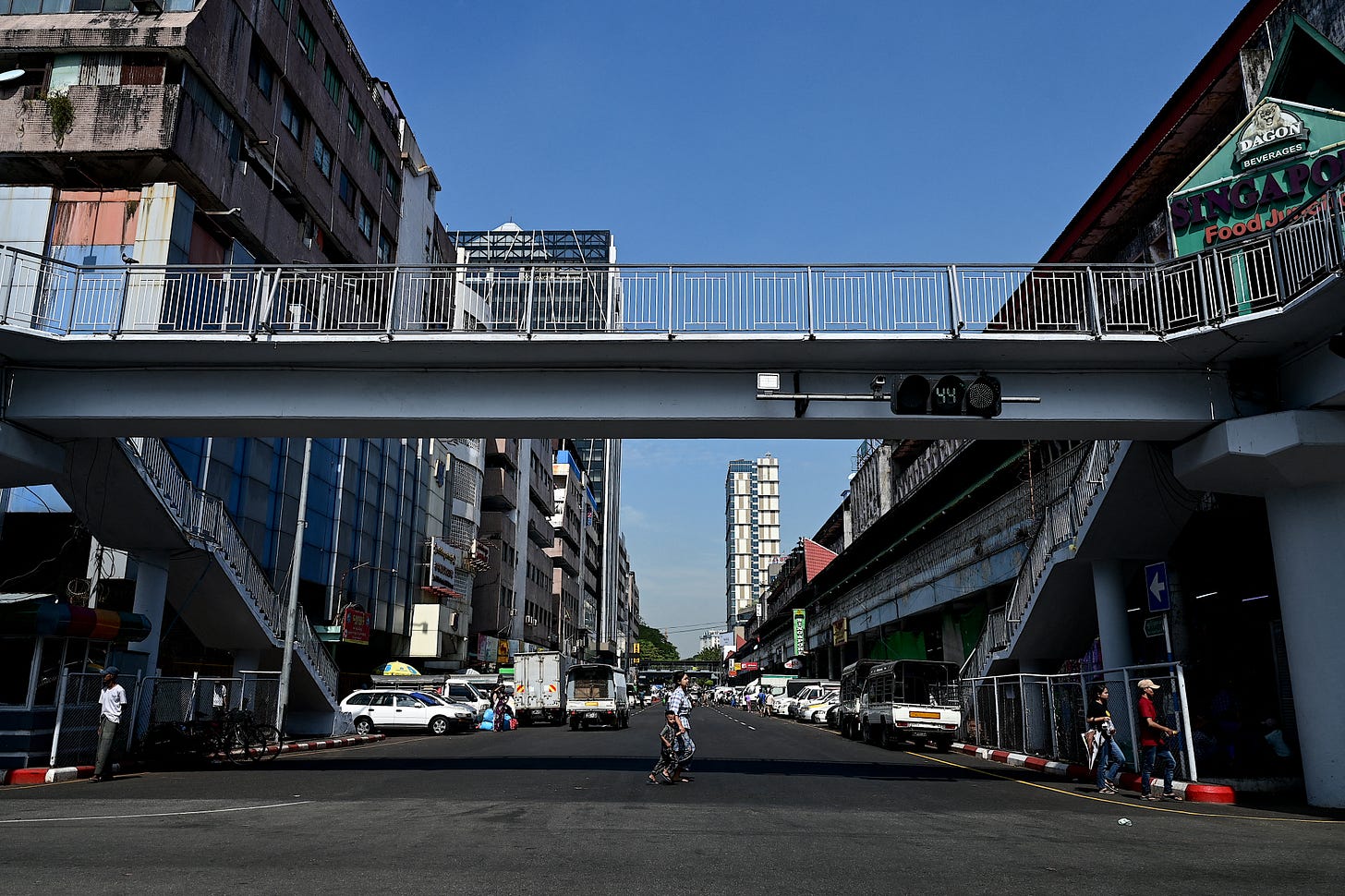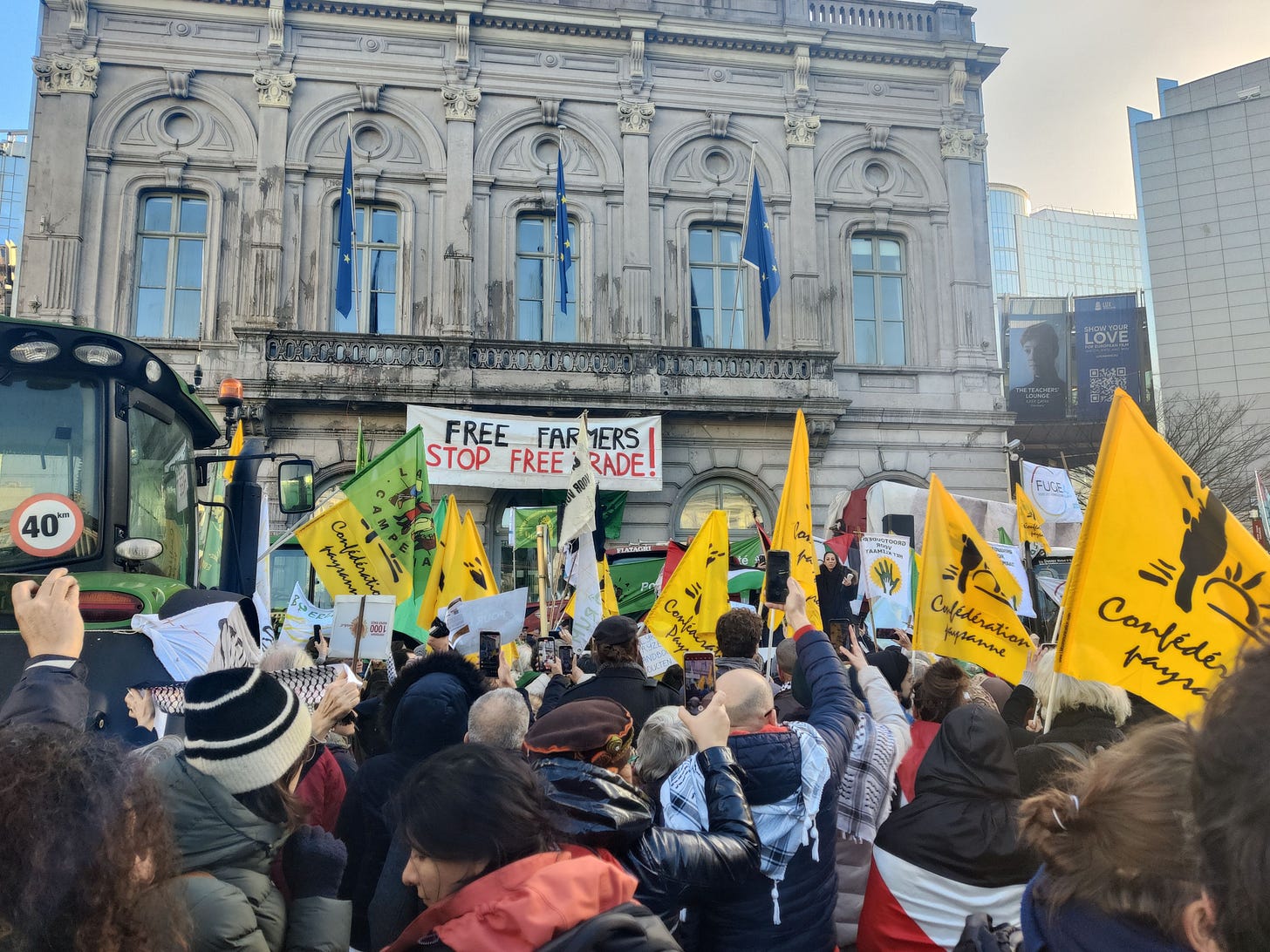Nolite te bastardes carborundorum
Because if we give up, they win, whether the fight is to transform food systems or dismantle Myanmar’s dictatorship
It was a balmy day in late November and we were lunching alfresco at a popular cafe in Bangkok when the topic of my two loves - Myanmar and food systems - came up.
My friend, who has known me for more than a decade, asked how I juggle the two, since they seem to be poles apart. I told him they are actually very similar.
I told him both are about rebirth, renewal, and breaking free from the structures that seek to keep us down, accept the status quo, throw up our hands and go, “Well, it’s better the devil you know.”
But if we give up, the winners are the forces that prize short-term private profits and personal power over long-term public wealth, social equity and inclusion. These are forces that thrive on disinformation, discrimination, and discord.
I’ve been revisiting that conversation almost every day since and thought it would be timely to expand on it this week, what with the third anniversary of the coup in Myanmar and the farmer protests roiling many parts of Europe.
And yes, I’m using Margaret Atwood’s version of the made-up mock Latin phrase as the title. Don’t worry if you’re not familiar with it. I wasn’t either until my husband pointed it out. In plain English, it’s supposed to mean “don’t let the bastards grind you down.”
On Wednesday night, I was returning to my hotel in Brussels after dinner with friends - I’m on a work trip - when we encountered a long row of heavy-duty tractors marching towards the European Parliament.
On Thursday morning, I woke up to the sound of sirens, blaring horns, and what sounded like a helicopter hovering close by. I looked at my watch. It was not yet 7 in the morning. Farmers had turned up en masse in front of the parliament to express a variety of grievances that have been brewing for a good while.
Meanwhile, the residents of Yangon, Myanmar’s former capital and my birthplace, showed their displeasure by staying in. News reports and images on social media showed a ghost town, where the usual hustle and bustle had been replaced by an eerie calm, like scenes in a Hollywood disaster movie.
Visually, these two protests, occurring thousands of kilometres apart, cannot be more different, but the sentiments they were expressing have commonalities. These are acts of resistance by people who are at the end of their tether and want to send a message to their rulers and the rest of the world.
But there is also one big, glaring difference.
There are few things in life that are as black and white as what is happening in Myanmar. A whole country is in revolt against a vicious and paranoid military that is managing to cling to power mainly due to its sheer brutality, the incompetence and self-interest of neighbouring nations, and the abandonment of the international community.
The farmers’ protests in Brussels on Thursday and in many parts of Europe? So very many shades of grey. Much of the mainstream media as well as policymakers have focused on the far right’s involvement in some of the protests and/or the supposed backlash against green policies.
But there are also many farmers who are protesting because they want a real green transformation, dislike trade deals, and/or are buried under a mountain of bureaucracy while struggling to make ends meet.
So in the case of farmers, when I say, “We can’t let them win”, they = anyone who wants to maintain the status quo, including policymakers, media, and members of farming community who only represents the interests of Big Ag.
On Myanmar
In the three years since the military seized power, the situation in my home country has deteriorated in a way that is both horrifying and unthinkable. Nearly 2.6 million people are now internally displaced. In Sagaing Region in the north, almost one in two has had to flee their homes. In Rakhine State in the west, one in eight did.
A third of the population - 18.6 million people - are estimated to need humanitarian assistance and nearly 25% cannot feed themselves sufficiently because the crisis has undermined not only food availability but also accessibility and affordability.
At the same time, the military’s abuses against its own citizens - some of which have been labelled “war crimes” by Human Rights Watch - continue unabated.
A specialist U.N. Group which has been collecting and analysing evidence from hundreds of sources said the evidence “reveals a pattern that indicates that these are not isolated crimes but rather a manifestation of an organisational policy, implemented on a widespread and systematic basis by the military regime.”
“No one has yet been held accountable for these crimes, which has deepened the culture of impunity in the country,” it added.
Fighting has intensified over the past two months, since an anti-junta coalition of three ethnic armed groups launched Operation 1027, named after the day and the month the offensive began.
Much hope - perhaps too much - is riding on the continued success of Operation 1027 and there are whispers of disenchantment within the army ranks although it is impossible to determine the accuracy of these reports.
What is certain is that many lives have already been lost and many more are likely to suffer in the coming weeks and months.
On Farmers
Brussels’ Place du Luxembourg is usually a place for staffers, parliamentarians, lobbyists and activists who work in and around the European Quarter. During lunch hours and in the evenings, its terraces and cafes are teeming with folks linked to the European Parliament, which sits across the square.
But on Thursday, the square and the long, straight road leading to it - Rue du Luxembourg - were taken over by a long line of parked tractors and a large contingent of frustrated farmers. There were also a few destructive aggressors: I feel like I have to make this point because during the hour or so I was there, I found a vast majority of people to be neither drunk nor aggressive.
In fact, it was a motley crew of small-scale farmers, peace activists, and environmentalists. Farmers groups with more resources and representing bigger, industrial-scale farmers also turned up. Someone even saw a pro-Russian campaigner.
But the original initiators of Thursday’s protests were European Coordination Via Campesina (ECVC) and FUGEA, one of its Belgian members, said ECVC. Other groups representing small farmers in Spain, Portugal, Netherlands, Germany, France, and Belgium were there too.
Amid the sound of firecrackers and loud dance music were a pyre made of burning tyres, Extinction Rebellion flags, and demands for a ceasefire in Gaza.
ECVC and the small farmers’ unions were also adamant they didn’t come to Brussels to destroy things but to demand four concrete actions:
Stop EU-Mercosur trade deal and suspend other free trade agreements linked to agriculture (farmers fear these deals would force them to compete with imports that do not have to meet similarly high environmental and sustainability standards)
Fair prices for agricultural produce, meaning prices should cover rising production costs and working hours
An equitable distribution of the Common Agricultural Policy (CAP)
Less red tape.
Shades of Grey
In case you didn’t notice, there was nothing about rolling back environmental provisions, banning immigration, or the hijacking or misappropriation of the term “food sovereignty”, and yet that is the general portrayal and understanding of these protests.
Let me just take you through a whistle-stop tour of press statements, including from two groups that were present at Thursday’s protests.
“All farmers who already practice environmentally-friendly farming practices and all those who decide to embark on an agroecological, more sustainable transition process must be supported and accompanied in the long term. It is unacceptable that under the current CAP, a minority of very large farms receive hundreds of thousands of euros in public aid while the majority of European farmers receive little to no aid at all.” - ECVC
“ECVC is concerned to see attempts from the far right to exploit and use this anger and the mobilisations to drive its own agenda, including denying climate change, calling for lower environmental standards and blaming migrant workers in rural areas, all of which has nothing to do with farmers’ interests nor improves their future prospects.”
France’s Confédération Paysanne, a member of ECVC and represents small farmers acknowledged that “administrative simplification is necessary” while saying “the demand of the majority of farmers protesting is to live decently from their profession, not to deny health and climate issues or to further erode our meager social rights”.
“We will fight on the ground against any form of cooption of our anger to fuel chaos, encourage withdrawal into oneself, and ultimately pursue the forward flight of a system that pits us against each other. We also call for peaceful mobilizations respecting individuals, public property, and free from racism, sexism, or any other form of discrimination.”
IFOAM, which represents organic farmers, echoed these sentiments, warning that “legitimate concerns about unfair prices and competition should not be misguided against health and nature protection.”
“The Green Deal and the Farm to Fork strategy are critical policies and cannot be blamed as the cause of farmers’ difficulties, since most legal proposals related to agriculture have been blocked, rejected or watered down, and have had zero impact on farmers so far.”
I bolded the above statement because this is what many people, including the media, forget when they parrot Big Ag’s talking point that the environmental provisions are a burden. Eric Gall, deputy director for IFOAM Organics Europe, explained this further in a LinkedIn post.
Why we can’t give up (1)
Contrast these statements with two of the paragraphs in this intriguing FT article.
“The protests are in large part driven by dissatisfaction with policymakers who prioritise cutting carbon emissions and preserving biodiversity over supplying consumers with homegrown food.”
“Farmers are particularly angry with the bloc’s “farm-to-fork” strategy and other regulations they say damage their competitiveness against imports, even as they struggle with inflation and more extreme weather.”
Look, the FT article made some important links, including how at least one recent protest in Brussels was organised by MCC Brussels, a think-tank backed by Hungarian PM Viktor Orban and chaired by his political director.
But I have two quibbles: the tone of forgone conclusion on what the protests are mainly about and the lack of any alternative voices.
Farmers are not a monolithic group and we neglect the nuances of these protests at our own risk. This is the desired outcome for people who want to keep profiting from the current system, which isn’t working for the vast majority of us, including the groups who grow the food.
The folks who want these broken, unequal, destructive food systems to continue would like us to think a new system is too expensive, will take too long, will lead to a collapse in yields and incomes. They want us to cower in fear, delay the decision-making, and believe there are no alternatives. But there are.
One of the people I spoke to yesterday was Leonardo, a young Dutch farmer whose small and sustainable vegetable farm in the middle of The Netherlands has 200 subscribers who pay annual fees, a model known as Community-Supported Agriculture (CSA). The customers can come and harvest every week.
“We have over 60 types of vegetables so we always try to ensure there’s always something they can harvest,” he said. “The farm is only one hectare but we are able to produce quite a lot and support 200 people.”
Despite not receiving any public subsidies, the farm is profitable, but Leonardo say the big challenge is land tenure security and Dutch legislation needs to change.
“We are renting land and we have a contract for six years. After that we don’t know.” He knows of others who only have one-year contracts, which heightens uncertainty for the farmers and also discourages them from investing in the land.
This is just one model that works. There are many others and consumers are also willing to support the transition, as I’ve written in a previous issue last month.
Yet policymakers, whether by design or for political expediency, also respond as if farmers are a monolithic group (see this tweet).
They focus on short-term fixes, like derogations from efforts to protect biodiversity, because the real transformation we need, like reforming the CAP in the EU, is too difficult.
Why we can’t give up (2)
In a similar vein, the junta wants the world to forget about Myanmar.
They want the international community to think Myanmar is too broken and too difficult and they are the only institution in the country that could act as a unifying force. They want Western diplomats to leave the issue of Myanmar to the ineffectual ASEAN.
They want us - the Burmese - to think we cannot win because they have superior fire power. They want particularly the Buddhist Burmese to think the country will fragment and Buddhism will disappear if we eliminate racist laws and give autonomy to the minority groups.
Which is why we need to keep talking about Myanmar. Why we need to keep emphasising that farmers - and farmer protests - come in different shapes, sizes, and colours. Why we need to keep exposing and challenging those who want to keep the status quo.
We can’t let them win.
Further reading on farmers’ protests
‘The world is changing too fast for us’: organic farmers on urgency of French protests - The Guardian
Echoes of Discontent: Understanding the European Farmers’ Protests (op-ed) - ARC2020
Blame the System, Not the Farmers (op-ed) - ARC2020
Mass tractor protest set back climate action - Tortoise Media
Thin’s Pickings
Myanmar’s favourite dishes show the bonding power of food - Nikkei Asia
My ode to Burmese food, which is often misunderstood and dismissed, and the new and old friends I made during the weeks I spent in Thailand last year.
The return of danger - Inkcap Journal
A beautifully written excerpt of Groundbreakers: The Returns of Britain's Wild Boar by Chantal Lyons about, yes you guessed it, wild boars.
We’ve Got Answers: Food Systems - OECD Trade and Agriculture
A short and effective summary of the triple challenge around food systems.
As always, please feel free to share this post and send tips and thoughts on mastodon @ThinInk@journa.host, my LinkedIn page, twitter @thinink, or via e-mail thin@thin-ink.net.








You captured the shades of grey, indeed of green, perfectly. Thanks.
Here’s hoping both issues can be resolved soon
Both problems are more complex than usually presented in the media, as you show in your article. About farmers, the Green Deal has not done enough to support the transition and that is the main cause of the difficulties expressed by the sector today. Short term fixes (eg tax relief on fossil fuels) may stop protests but delay sustainable solutions (energy savings and « green » energy production). Long term vision needed…